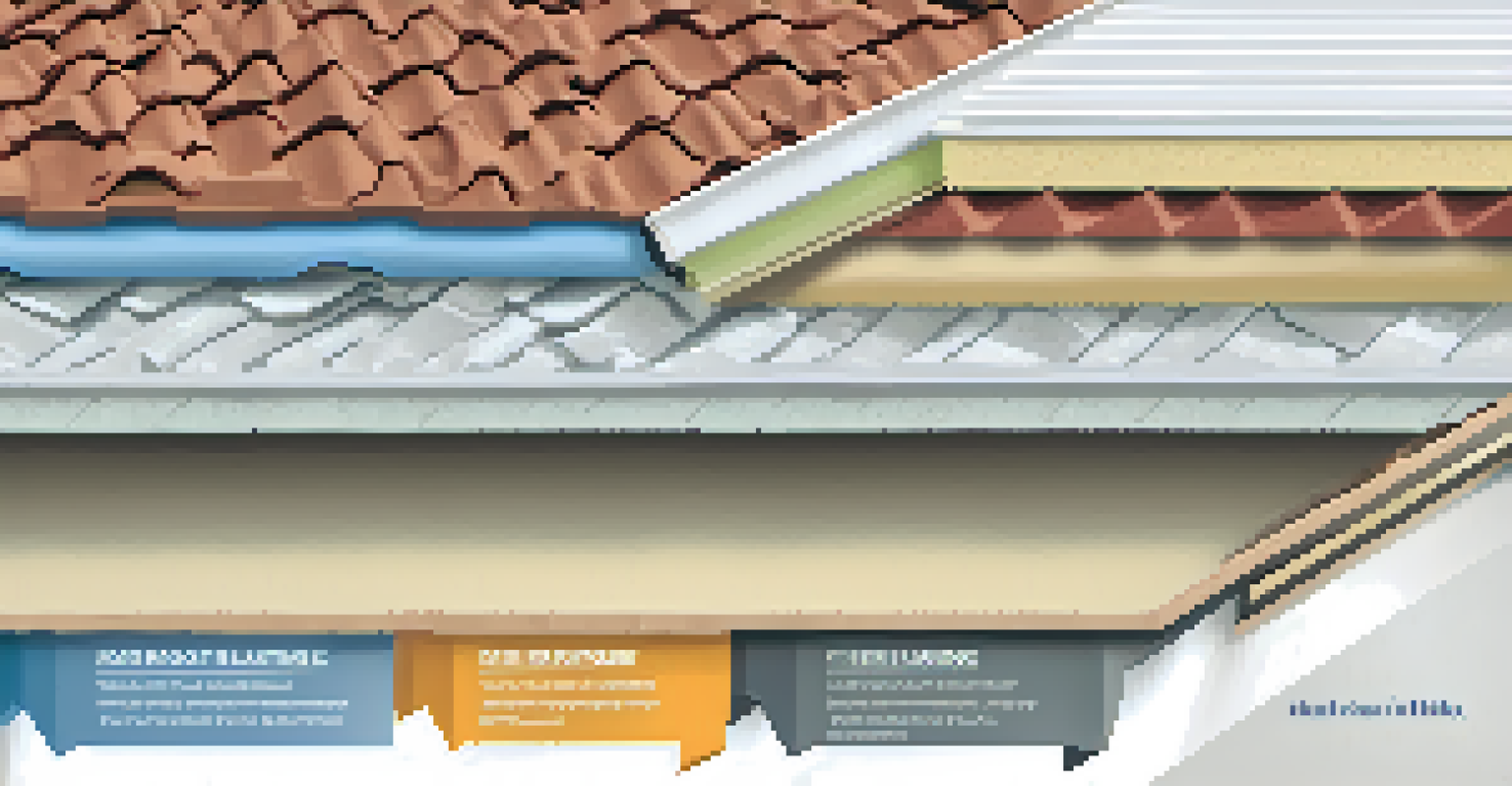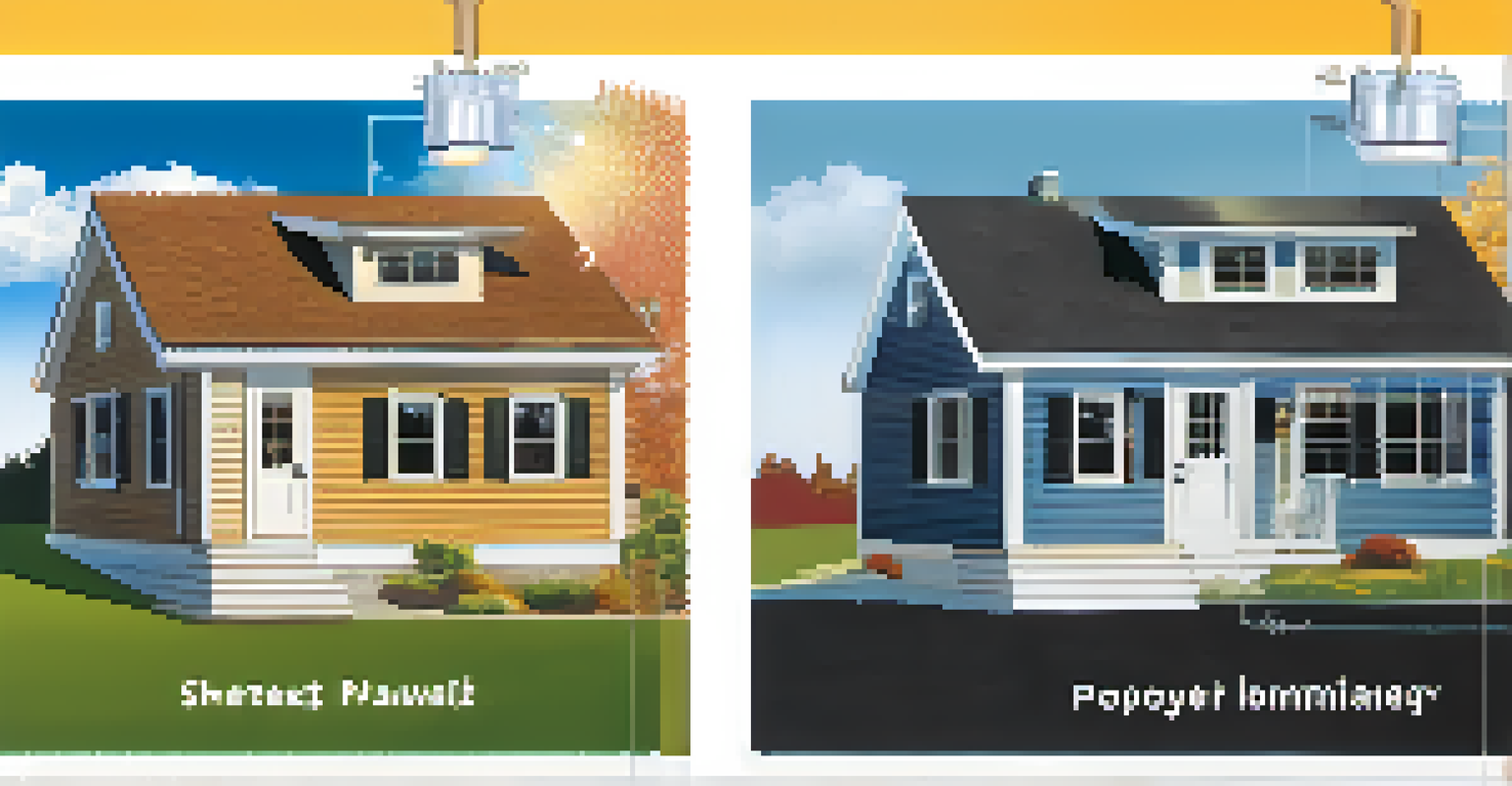The Role of Roof Insulation in Energy Efficiency Strategies

Understanding Roof Insulation and Its Importance
Roof insulation is a critical component of any energy-efficient home. It acts as a barrier, preventing heat loss during winter and keeping your space cool in summer. By maintaining a stable indoor temperature, insulation reduces the need for excessive heating and cooling.
Insulation is the key to energy efficiency in any building, and it protects your home from the elements while saving you money on energy bills.
Many homeowners overlook roof insulation, thinking it’s only a luxury. However, it plays a significant role in overall energy efficiency and can lead to substantial savings on utility bills. For instance, homes without proper insulation can lose up to 25% of their heat through the roof.
In essence, roof insulation is not just about comfort; it’s about smart energy use. By investing in quality insulation, homeowners can enjoy a more comfortable living environment while contributing to energy conservation efforts.
Types of Roof Insulation Materials Available
There are several types of roof insulation materials available, each with its own benefits. Common options include fiberglass, foam board, and spray foam. Fiberglass is popular for its affordability and effectiveness, while spray foam offers superior air sealing capabilities.

Choosing the right material often depends on factors such as climate, roof type, and budget. For example, in colder regions, rigid foam board might be more effective due to its higher R-value, which measures insulation's effectiveness.
Roof Insulation Saves Energy Costs
Proper roof insulation can reduce energy bills by up to 20% by minimizing heat transfer.
Ultimately, understanding the different types of insulation can help homeowners make informed decisions. A well-chosen material can significantly impact a home's energy efficiency and comfort levels.
How Roof Insulation Enhances Energy Efficiency
Roof insulation enhances energy efficiency by creating a thermal barrier that minimizes heat transfer. This means your heating and cooling systems don’t have to work as hard, leading to lower energy consumption. Essentially, good insulation keeps the desired temperature in your home stable.
Good insulation is not an expense, but an investment in your comfort, health, and the environment.
For example, during winter months, proper insulation prevents warm air from escaping, allowing your furnace to operate more efficiently. Conversely, in summer, it keeps the hot air outside, reducing the workload on your air conditioning system.
By improving energy efficiency, roof insulation not only reduces energy bills but also lowers your carbon footprint. This makes your home more environmentally friendly and contributes to a sustainable future.
The Financial Benefits of Roof Insulation
Investing in roof insulation can lead to significant financial savings over time. Homeowners may see a reduction in energy bills of up to 20% or more, depending on their current insulation situation. This means that the upfront cost of insulation can pay for itself within a few years.
Moreover, many governments offer incentives or tax credits for energy-efficient home improvements, including insulation. This can further offset the initial investment and make insulation even more financially appealing.
Choosing the Right Insulation Matters
The effectiveness of roof insulation varies by material and climate, making informed choices essential.
In addition to lower energy costs, good insulation can increase a home's resale value. Potential buyers often look for energy-efficient features, making your home more attractive in a competitive market.
DIY vs. Professional Roof Insulation Installation
When it comes to roof insulation installation, homeowners often face the choice between DIY and hiring professionals. While DIY can save money, it requires knowledge and skills to ensure proper installation. Improper insulation can lead to air leaks, negating energy efficiency benefits.
On the other hand, hiring professionals ensures that insulation is installed correctly and meets local building codes. They also have access to high-quality materials and advanced techniques that can maximize energy efficiency.
Ultimately, the decision should be based on your comfort level with home improvement tasks and the complexity of the project. For many, the peace of mind that comes with professional installation is well worth the cost.
The Role of Roof Insulation in Sustainable Building Practices
Roof insulation plays a vital role in sustainable building practices. By enhancing energy efficiency, insulation helps reduce reliance on fossil fuels for heating and cooling. This is crucial in the fight against climate change, as buildings are significant contributors to greenhouse gas emissions.
Moreover, sustainable building focuses on resource conservation, and good insulation minimizes energy waste. This aligns with the broader goals of creating eco-friendly spaces that are kind to the planet.
Professional Installation Ensures Success
Hiring professionals for insulation installation guarantees compliance with building codes and optimal energy efficiency.
Incorporating roof insulation into new constructions or retrofits not only benefits the environment but also promotes healthier living conditions for occupants. It's a win-win situation for both homeowners and the planet.
Navigating Roof Insulation Regulations and Standards
Understanding roof insulation regulations and standards is essential for homeowners. Building codes often dictate the minimum insulation levels required for energy efficiency. Familiarizing yourself with these codes ensures compliance and optimizes your home’s performance.
Local regulations can vary significantly, so it's wise to check with your local building authority. This can help avoid potential fines and ensure that your insulation project is completed correctly.

Additionally, many insulation materials come with performance certifications that indicate their effectiveness. Choosing certified products can provide peace of mind, knowing that you’re making a sound investment in your home’s energy efficiency.